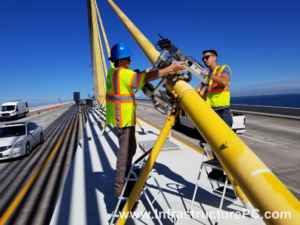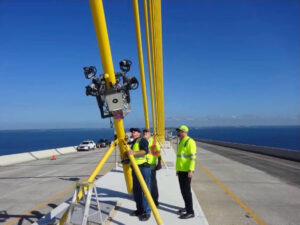Robots meet bridge, road inspection
Ex-NHDOT chief ’s company paves the way with new tech

Chris Clement’s new job is the culmination of previous jobs — as a machinist, an engineer for a printing press manufacturer, as commissioner of the NH Department of Transportation, and as vice president of finance at the University of New Hampshire.
He is now president and CEO of Infraspect, a newly assembled company that makes artificially intelligent infrastructure inspection robots.
“I’m so excited about this company, because it’s all my past careers rolled up into one job,” says Clement. “It’s machining, it’s engineering, it’s DOT and, believe it or not, it’s UNH.”
In a sense, Clement was recruited for his new job by his predecessor at NHDOT, George Campbell. It was a favor for Campbell that turned into a job offer.
Campbell, state DOT commissioner from 2008 to 2011, is a partner and advisory board chairman at Treadwell Franklin Infrastructure Capital LLC. Last December, while on winter break from his duties at UNH, Clement was asked by Campbell as a favor to travel down to Florida to look at Infrastructure Preservation Corp., the infrastructure scanning company Treadwell Franklin was thinking of acquiring.
“I went down, checked it out, came back and gave them a report,” said Clement. “And three weeks later, the second week in January, I got a call from Chairman Campbell and he said: ‘Hey, we’re going to take your advice, and we’re going to make a run to buy IPC.’ “I said: ‘That’s fantastic, George.’
And he said: ‘Here’s the deal; we’re only going to do it if you’re our president and CEO.’” Within a few short weeks with Clement at the helm, the board gave Clement its approval for the name change to Infraspect (a combination of infrastructure and inspection) and to open headquarters at 200 International Drive at the Pease International Tradeport in Portsmouth.
The company’s new world headquarters will be established in Portsmouth while the research and development division will remain in Largo, Fla., IPC’s original home. Clement said the company will occupy about 9,200 square feet of the Pease building, about 6,000 square feet of it for manufacturing.
Clement described the technology as “an EKG for your asset. Whether it’s a bridge or road, it tells you what’s going on in there.”
With inspections that might be done using a workman in a bucket truck or a drone, the robotic scan robot used by Infraspect can climb up and down a bridge cable, for example, using its magnetic flux leakage and video technology to peek inside and locate issues, such as corrosion and steel strand weakness. It has scanning technology that not only does cables and wire ropes, but bridge road decks, poles, and concrete tendons and columns as well.
Part of Clement’s challenge is getting his company’s inspection services accepted by state departments of transportation like the one he headed here in New Hampshire from 2011 to 2014.

The American Society of Civil Engineers in its 2021 report card gave the country’s public roads and bridges a C-minus grade. Its most recent report card for New Hampshire in 2017 was also a C minus. As of March 2022, according to an NHDOT report, the state had 114 red list bridges, down from 118 the year before. Red list bridges are those in the poorest condition.
“What I say to my former and current DOT secretaries is: We have this technology that can help you. You can head this stuff off at the pass. You can make these investments in a more intelligent way with data versus putting someone up in a bucket truck,” said Clement.
He can speak the language of a DOT commissioner, one who understands the budget implications of maintenance and repairs, but also one who understands that delay can jeopardize safety.
From his past contacts, he says he’s getting interest from transportation officials in Maine, Missouri, Tennessee, Massachusetts and in New Hampshire.

A new bridge, according to Clement, could use an Infraspect scan to establish a baseline, then get regular scans as a checkup. “If you catch it early, you can fix it,” he says.
Challenges ahead
Clement, who grew up in Somersworth and attended the University of New Hampshire after technical college in Stratham, started out professionally as a lathe operator in Newburyport, Mass., then as an engineer and product manager for Harris, then Heidelberg, which became Goss Manufacturing, all makers of printing presses and print-product packaging equipment used worldwide.
Goss at one time had plants in both Durham and Dover.
From Goss, he served as executive director of the state Office of Economic Stimulus before going to the NHDOT, appointed in 2011 by then-Gov. John Lynch.
With Maggie Hassan as governor in 2014, Clement left the DOT to become vice president of finance and administration for the University of New Hampshire in Durham.
Maine-based Treadwell Franklin provides development, financing, ownership and management services for infrastructure assets and businesses. In 2018, it acquired the James W. Sewall Company in Bangor, Maine, a 142-year-old company that offers a wide range of professional services related to civil and transportation engineering.
Treadwell Franklin’s acquisition of IPC in May expanded its engineering portfolio with technology scanning and imaging technologies for non-destructive testing and inspection of bridges, roadways, light masts, towers and other infrastructure projects in the United States and internationally.
Adding IPC “will anchor our wider asset management and O&M business. IPC is a great counterpart to Sewall as well, and we couldn’t be more pleased with this growth prospect,” said Stephen Rigal Jones, CEO of Treadwell Franklin. “We feel fortunate also to have Chris Clement at the helm. His background and energy are inspiring.”
Campbell, who was instrumental in getting Clement on board, said: “We cannot say enough good about what IPC has achieved, and the excitement we feel at helping enable the growth of the technology. We can’t wait to get started. We’ve watched IPC for several years. Having Chris on board is key for us. Come back and check on us in a couple years. IPC is going to do great things.”
Among the challenges ahead is getting the workforce in place once the Portsmouth office is fully established.
The Florida R&D facility will retain its half-dozen workers. In the meantime, Clement is looking for 15 to 20 people for the Pease location.
“If we’re going to scale the company, if we’re going to bring it from where it is now to a $20 million or $30 million or $50 million or $100 million company, you’re not going to do it in Florida. The talent is here, the workforce and the work ethic is here,” says Clement.
Clement believes the next generation of the company’s scanning technology could branch out of road and bridge infrastructure to check the structural health of buildings. Looking through concrete to inspect the integrity of the rebar inside would be the “holy grail,” according to Clement.
“There’s also a huge market of being able to look at a building, look inside there to see if there’s any stress fractures or any cracking going on. That could be a future development for our technology as well as in other markets,” he said.
He is excited about using his accumulated skills as he not only transitions himself to his new role but transitions the company to an expanded role in the marketplace.
“It’s like the job was made for me,” said Clement. “It’s really, really amazing.”
Read more at:
https://read.nhbr.com/nh-business-review#2022/07/29/?article=4001907